If you’ve ever noticed moss on your driveway, you are probably wondering how to properly remove it. We have researched this topic for you and found the most effective way to clean moss off all types of driveways.
There are multiple ways to remove moss from your driveway. However, as a quick general guideline for driveway moss removal, homeowners can follow these simple steps:
- Remove all surface plant growth using a garden rake, broom, or power washer.
- Decide on a cleaning agent and deck scrub the entire surface with a stiff-bristled push broom.
- Allow cleaning agent to soak into the driveway for at least 10 minutes.
- Do not allow cleaning agent and soap residue to dry on your driveway.
- Rinse the driveway off with a garden hose or power washer.
- Repeat steps as needed.
Most driveway moss removal techniques will include some variation of these basic steps.
To clean moss off your driveway, you will need to know which cleaning agents and tools to use and which to avoid. Not all methods of removing moss from driveways are good for your often expensive driveway surface materials. Additionally, a better understanding of the moss lifecycle will help you prevent future regrowth.
How to Clean Moss off Your Driveway
There are a few different techniques that people use to remove moss from their driveways. A scrub brush, broom, or power washer are great for removing the surface layer, but chemicals or cleaning agents may be needed to completely rid your driveway of moss and its residual stains. Use the steps below to clean moss off any driveway surface.
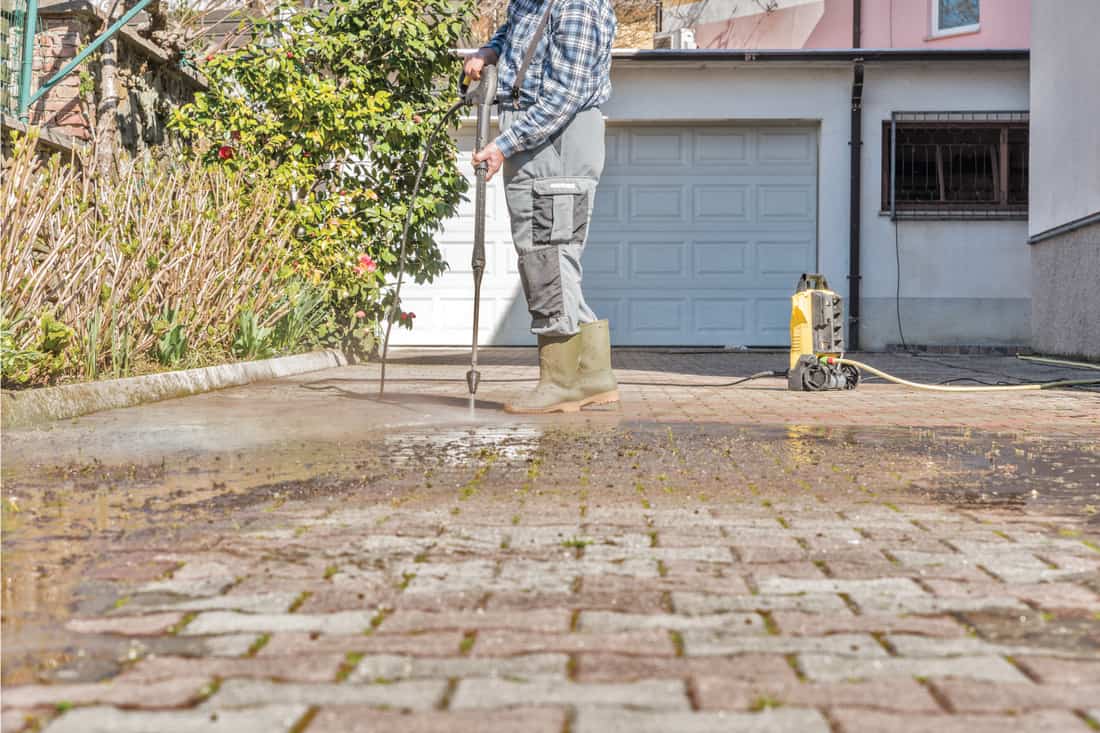
1. Remove All Surface Plant Growth Using a Garden Rake, Broom, or Power Washer
To begin the cleaning process, you must first loosen the plant growth using a garden rake or heavy broom, then clean up the plant debris before moving on to the next step. A power washer is also commonly considered by homeowners when planning on removing moss from a driveway surface.
Will a power washer remove moss?
A power washer is a good place to start when removing moss from your driveway, but using a power washer alone will most likely allow for regrowth. An environmental change, chemicals, or a cleaning agent specifically formulated for moss may be required to fully remove the moss from your driveway and ensure that it does not return.
However, power washing will quickly and effectively remove the top layer of moss growth and often remove some or much of the staining it leaves behind. To clean moss off your driveway with a power washer, work in small sections. Use dish soap for added cleaning power without introducing heavy chemicals to the environment.
Click here to see WHOLESUN 1600W pressure washer on Amazon.
If green, brown, or grey stains persist after cleaning with a power washer, your driveway may require further cleaning with natural or chemical agents. Manual scrubbing may also be required.
2. Decide on a Cleaning Agent and Deck Scrub the Entire Surface with a Stiff-Bristled Push Broom
After removing the surface growth, a stain will likely remain. You will have to decide which cleaning agent works best for your situation and deck scrub the entire stained surface. To deck scrub, simply use a stiff-bristled push broom, work in small sections and push hard as you use the broom’s head to aggravate the cleaning agent into the stain.
Below we discuss various options to be used as a cleaning agent. Some options are more effective than others, though some people will avoid heavy chemicals and opt for a more natural solution. If you can kill off the moss naturally on your property, this is always advised as the first line of defense as it is better for the environment around your home.
How do you kill moss naturally?
A great way to kill moss naturally is to change the moss’s environment to make it less optimal for growth. Introduce sunlight to the area moss is growing by trimming back shrubs and trees if possible. If water is collecting around the same area the moss growth is prevalent, consider diverting the water elsewhere.
A white vinegar solution works well for removing moss stains. It is not as abrasive as some chemicals, however, and may not always remove the stain completely. If you have just discovered new growth or the stains you’re cleaning are not very deep, vinegar should be an adequate cleaning agent that will not harm the environment.
Will bleach stain my driveway?
Bleach can significantly lighten some driveways. The lightening process does not necessarily cause a stain but may result in a noticeable color change. This is especially true of concrete paved driveways. Any porous material has the potential for lightening as a result of bleach exposure.
However, most people don’t mind lightening up their concrete driveway a bit, and bleach is often required to remove set-in moss stains. If your driveway has been covered with moss for many years, bleach may be the only way to drastically lighten the stains.
Store-Bought Cleaning Agents
There are many cleaning agents for removing moss from your driveway that you can purchase at major home improvement or garden centers. These formulas often require the addition of bleach, but there are more natural options out there as well.
Click here to see Simple Green concrete and driveway cleaner on Amazon.
Many of these solutions offer extended protection against moss regrowth, which is an added bonus. Also, many no-scrub options are made to be sprayed onto the surface and left. These formulas will generally still require the user to remove the actual plant growth from the driveway’s surface for better results.
3. Allow Cleaning Agent to Soak Into the Driveway for at Least 10 Minutes
Most cleaning agents require time to soak into the driveway surface. If you rinse off your cleaning agents too soon, it will not have time to penetrate and remove the stain. A general guideline is to start with 10 minutes and work up from there. Store-bought chemicals will have their own instructions, so make sure to read and follow them for the best results.
4. Do Not Allow Cleaning Agent and Soap Residue to Dry on Your Driveway
Allowing the cleaning agent to dry on your driveway will only cause more work for you. Not only will you have the original moss stain left to tackle, but you will also have a gross layer of soap residue that you will need to first remove before you can address the moss stain below. Also, some cleaning agents such as bleach or dyed store-bought solutions may lighten or further stain your driveway.
5. Rinse the Driveway Off with a Garden Hose or Power Washer
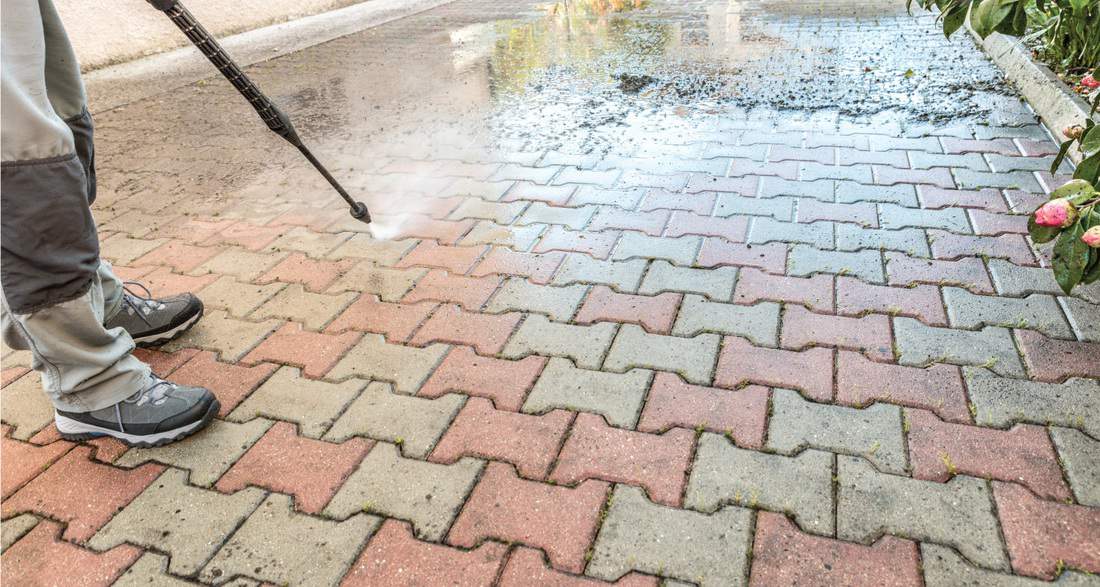
After letting the solution soak into the driveway surface, rinse it all away with a garden hose or power washer. Make sure all soap residue is rinsed off. Be careful not to push the chemicals into adjacent flower beds or other important landscaping, as it may harm or kill off nearby plant life.
6. Repeat Steps as Needed
For really tough moss stains, you may need to repeat the cleaning process a few times. You may be able to see an effect if you repeat the steps immediately, but it also may work better to wait a few days to do another round of cleaning. Also, consider trying a different cleaning agent if the first one you tried was ineffective.
Is Moss Bad for Driveways?
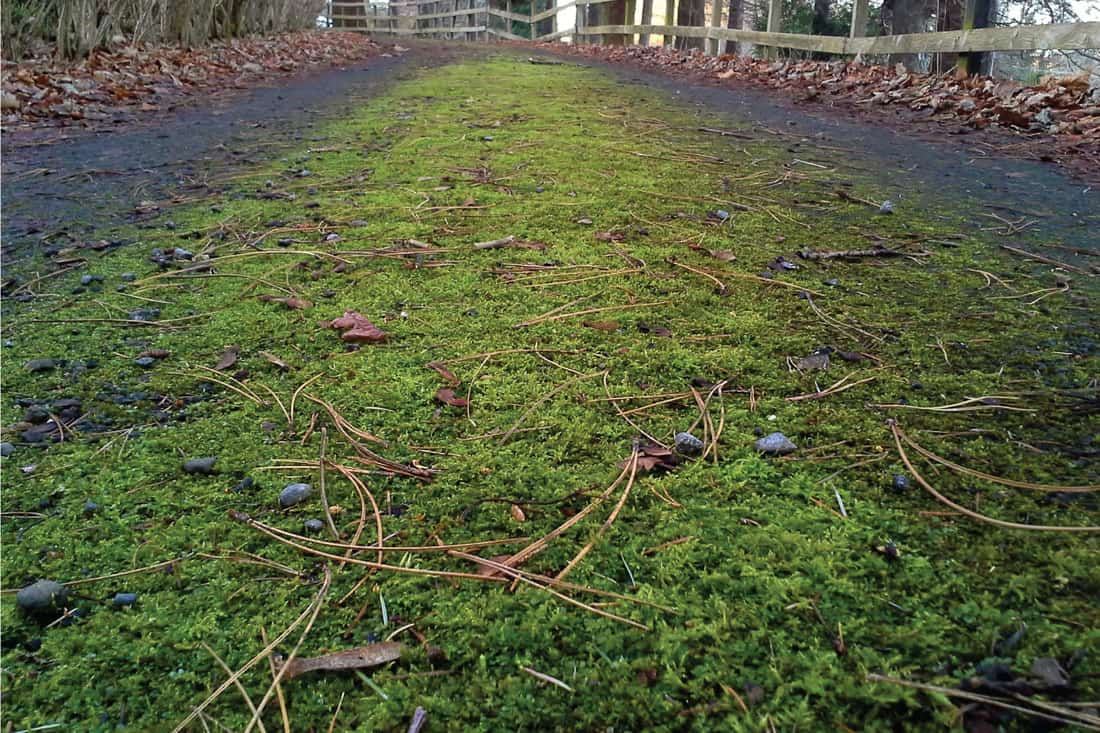
Regardless of structural issues, it is not suggested to allow moss to grow on your driveway. The moisture in the moss will cause a more slippery surface, which is not optimal for an area that’s sole function is to support vehicle and foot traffic. Also, it leaves unsightly green, brown, or black stains.
Aside from being hazardous to pedestrians and staining, moss will generally lead to a shorter driveway lifespan for almost all types of construction materials. It is not particularly damaging to the surface of your driveway, but if it begins to grow in any cracks or crevices, it can cause damage over the years. Some common driveway construction materials are:
- Concrete
- Asphalt
- Brick
- Gravel
These are just a few of the most commonly used driveway surfaces, but you can check out a long list of different types of driveways here.
Is moss bad for concrete?
Moss growth can cause microscopic changes to the structure of your concrete driveway, particularly in the cracks and around any pre-existing chips or pockets. If you live in a colder climate, moss holding heavy moisture may freeze and cause further damage, especially if growing in the cracks between your pavers. Moss in these areas can slowly push away and erode the edges of your driveway.
Is moss bad for asphalt driveway?
Due to the sponge-like nature of moss, it can also be bad for asphalt driveways. Though moss seems to be least damaging to this particular type of driveway, it still holds moisture against the surface and may cause the asphalt to break down prematurely if growing in small cracks and crevices on the surface of your driveway. It is generally suggested to prevent and remove all plant life from any driveway surface.
Is moss growing on brick bad?
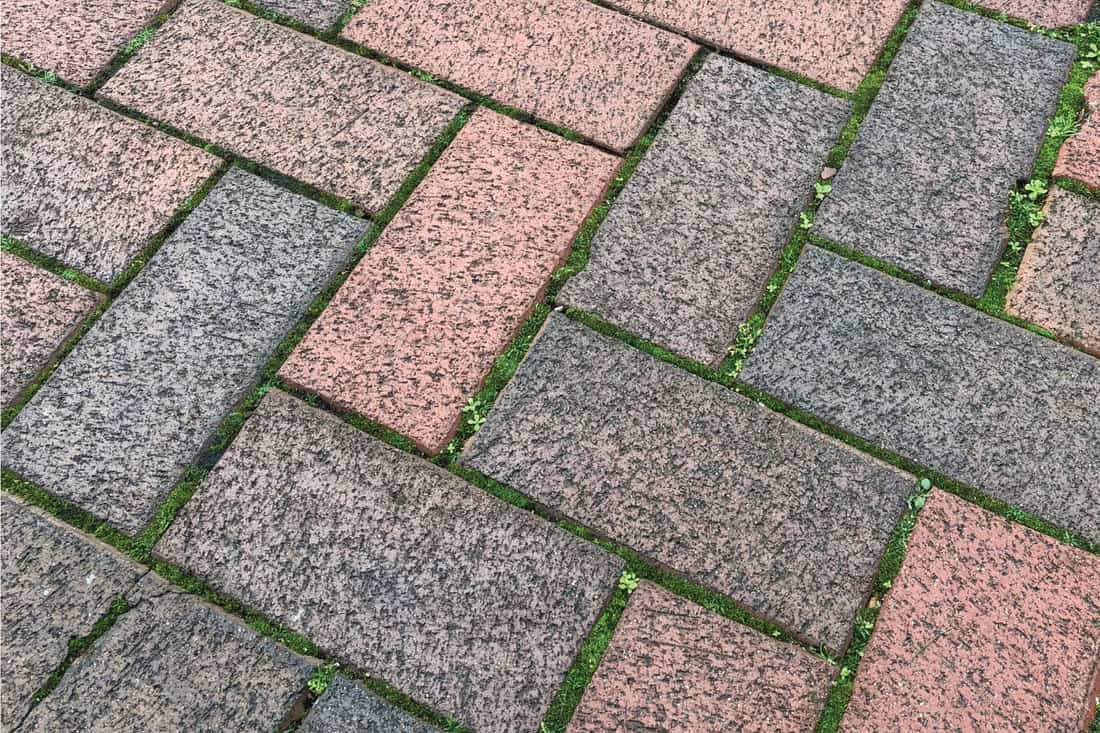
Allowing moss to grow on brick is bad for the structure of your home because moss can hold moisture against the brick and cause premature deterioration of mortar. You may not have any mortar to worry about for a brick paved driveway, but it is still a cause for concern. Brick is relatively porous and can also break down over time if exposed to excess moisture.
Is a Gravel Driveway Safe from Moss?
A gravel driveway is not safe from moss growth. Moss can and does grow and spread on the small pebbles of gravel driveways. This moss often grows on the actual stones themselves and can spread quickly because the rocks are loose and move around a bit due to traffic, wind, and insect and animal interference.
Prevent Driveway Moss from Growing Back
To prevent moss from growing on your driveway again or in the first place, you have to understand what makes moss grow on a driveway in the first place. You should also have a basic understanding of moss’ lifecycle and reproduction habits to better combat future growth. Taking certain preventative measures can increase the likelihood of never having to deal with moss on your driveway again.
Does moss spread on its own?
Moss does not have roots or seeds but is capable of spreading on its own. There are two ways moss spreads.
Pleurocarpous moss is more like a traditional plant in that new growth stems from the plant’s main structure. In contrast, Pleuorcarps use fragmentation, where they spread by breaking off and starting entirely new plants where they land if conditions are optimal for growth. Pleuorocarps tend to spread and grow more quickly than Pleurocarpous mosses.
Use Driveway Sealants to Prevent Stains and Discourage Moss Growth
Driveway sealants available at home-repair and garden centers provide a good option when killing and preventing moss regrowth. Some of these sealants are made specifically to prevent stains from adhering to your driveway surface. These types are a great option for homeowners struggling with moss control on their paved driveways.
Click here to see asphalt driveway sealer on Amazon.
How to stop moss from growing between pavers?
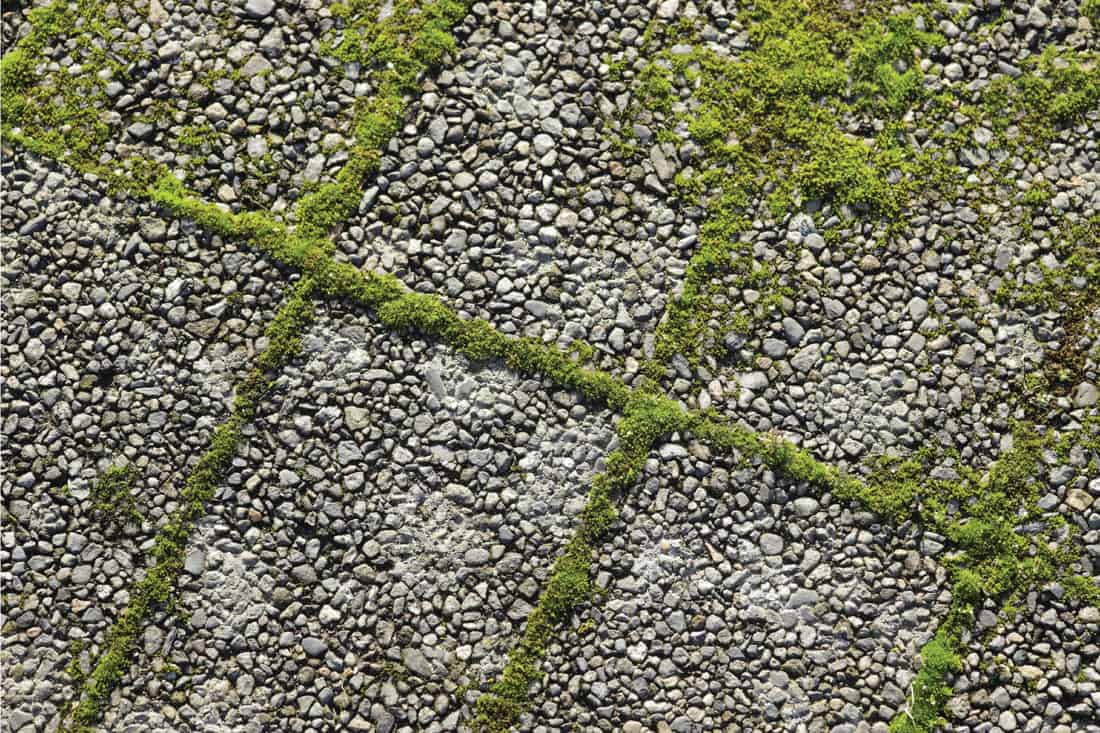
Sunlight is your best friend when trying to ward off moss growth. Moss does not like to grow in well-lit, sunny areas. If you can somehow reduce the amount of shade on your driveway, this will drastically help keep moss from growing between your concrete pavers.
Keeping the area dry is another great way to encourage a moss-free environment. Limiting the moisture on and around your driveway will make the area less welcoming for moss.
If you can bleach, then fill the gaps between your pavers with flexible putty or caulking of some type, this will also deter moss growing up from the dirt in between.
Driveway Moss Removal and Prevention of Regrowth
If you follow the steps listed above, you should have no problem removing moss from any type of driveway. Stains may persist if the moss has been on the driveway for many years, so it is best to address the issue immediately. Prevention of regrowth is key and will ensure stains are not able to set in.


